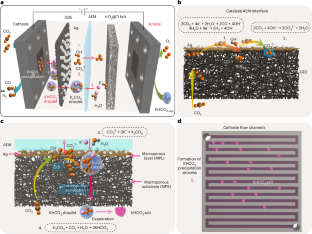2025-03-25 マサチューセッツ工科大学 (MIT)
<関連情報>
- https://news.mit.edu/2025/mit-engineers-develop-pesticides-stick-on-plant-leaves-0325
- https://pubs.rsc.org/en/content/articlelanding/2025/sm/d4sm01496k
農薬汚染を軽減するために遮蔽液滴を使用してスプレー保持を強化する Enhancing spray retention using cloaked droplets to reduce pesticide pollution
Vishnu Jayaprakash, Simon Rufer, Sreedath Panat and Kripa K. Varanasi
Soft Matter Published:25 Mar 2025
DOI:https://doi.org/10.1039/D4SM01496K
Abstract
Enhancing agrochemical spray retention on plant surfaces would have tremendous benefits to global health and the environment. The bouncing of sprayed pesticide droplets from hydrophobic leaves is a major source of water and soil pollution, and the resultant overuse of pesticides is a human health hazard and a financial burden for farmers. Here we report on the development of sustainable agricultural sprays consisting of cloaked droplets that significantly enhance droplet retention on plant surfaces. By leveraging wetting dynamics, we create cloaked droplets that consist of an ultra-thin food and environmentally safe oil layer (<1% by volume) that encapsulates water droplets. We develop a fundamental understanding of the dynamics of cloaked droplet impact and retention on superhydrophobic surfaces. Using high-speed imaging, we capture how the oil cloak transforms into a wetting ridge that pins the droplets and suppresses their rebound. We span a wide range of impact conditions, oils, oil viscosities, and oil volume fractions to demonstrate the robustness of the approach. By considering a balance of kinetic energy, the work of adhesion, and viscous dissipation in this four-phase system, we develop a physical model that allows us to establish a regime map for rebound suppression. Finally, these findings are implemented into a prototype sprayer which leads to a ∼5-fold reduction in spray waste on crop leaves. We believe that our spray approach can greatly reduce agrochemical pollution as well as pesticide and surfactant usage.




